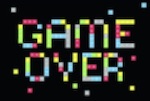|
ENG 7800
Dr. Edmond Chang Download the course policies and syllabus (PDF).
"You are in a maze of twisty passages, all alike."
"There's a toxicity within gaming culture, and also in tech culture, that drives this misogynist hatred,
this reactionary backlash against women who have anything to say, especially those who have critiques or
who are feminists. There's this huge drive to silence us, and if they can't silence us, they try to
discredit us in an effort to push us out."
|
ALEXANDER GALLOWAY in Gaming: Essays on Algorithmic Culture argues that play "is a symbolic action for larger issues in culture" and that video games "render social realities into playable form." This online course offers an intensive survey of the key terms, questions, and theories of the interdisciplinary fields that make up "video game studies," paying particular attention to recent debates, conversations, and texts, in order to address the critical, cultural, even pedagogical value of games. We will practice formal, textual, and "close playing" analyses of games from platform to representation, narrative to mechanics; we will explore a range of critical approaches including creative, ludic, rhetorical, feminist, queer, and cultural theories; finally, we will develop a working vocabulary for video game studies addressing keywords like play, character, avatar, story, algorithm, fun, immersion, power, race, gender, sexuality, disability, environment, and more. Texts may include Lisa Nakamura, Ian Bogost, James Paul Gee, Mary Flanagan, Adrienne Shaw, Alexander Galloway, Miguel Sicart, Bonnie Ruberg, William Gibson, Judith Halberstam, Kishonna L. Gray, Ernest Cline, Anna Anthropy, Jane McGonigal, Julian Dibbell, Tanya DePass, Evan Narcisse, and others. Game play will be required but previous gaming experience is not necessary. A REQUIREMENT for this class is a well-developed curiosity about the world, about the culture we live in, and about the cultural productions we imagine, produce, and consume. In other words, this class is about reading, critiquing, and analyzing our culture through different texts and games. We will engage the techniques and practices of reading scholarship and playing games. We will identify and develop different ways to read different kinds of texts and understand and develop strategies, habits, and perspectives of reading, thinking, and writing. We will also close read and close play for analysis. And lastly, we will read, play, and deploy games as theory, as dramatizing the concerns, wonders, struggles, and politics of lived life and experience. SPECIFICALLY, our course goals include:
• We will develop and demonstrate a familiarity with a range of texts, terms, and theories,
engaging with video game studies.
WE WILL spend the quarter asking and addressing difficult,
challenging, and sometimes discomforting ideas, questions, and topics, focusing on different
identities, bodies, histories, desires, experiences, and even struggles and violences. Whether
on the page, screen, on campus, or in the community, we will explore and engage multiple perspectives,
levels of familiarity with the material, and heady and heartfelt responses. In other words, our
class will be a safe, respectful, but not necessarily comfortable space. While pushing boundaries
and comfort zones are essential to critical thinking, making connections, and intellectual and
personal freedom, see me with concerns and queries, for reasonable accommodations, and for further
resources on campus.
|
"Video games have an unmet potential to create complexity by letting people experience the world
from different perspectives."
Required Course Texts & Materials
• Bogost, Persuasive Games.
|
|
Course Requirements
Presentation (20%) Download the course policies and syllabus (PDF).
|
Requirements & GradingYour grade should not be the sole exigence or motivation for this class. It is the hope of the course that you walk away from our class with something more. Find some pleasure and some edification and some knowledge from this class (or any class really) and success is usually not far behind. With that in mind, your grade will be a reflection of engagement, effort, close reading, critical thinking, writing, and participation. Critical Theory & Pedagogy Presentation (20%) You will be a required to sign up for an online teaching presentation. For the presentation, you will read the texts assigned for your week. Then, with the guidance of the instructor, you will select one key text to summarize and to generate a short lecture or activity, which provides a critical question or two to inspire discussion. This exercise asks you to think about online teaching, how to teach theoretical texts, and to demonstrate creative pedagogically practices. Presentations are 10-15 minutes, require a substantive discussion thread posted to Blackboard, and should engage multimodal pedagogy. Precis Papers (20%) The majority of the writing you will do for this class is in the form of short, analytical precis papers. These single-spaced, one-page writings serve as close readings of, analytical summaries of, and articulations of the main arguments and ideas of one of the week's theoretical texts. These responses are not personal reactions or applications of theory and will be graded on clarity, focus, coherence, and your ability to formulate concise detail. You will be required to generate a precis paper approximately every other week for a total of 7. See the response paper prompt for more details. Project Proposal Memo (10%) As part of your Final Project research and writing process, you must generate a 1-page research proposal in business memo format. You will also arrange for a conference with me to go over your proposal. Proposals will be graded for clarity, detail, completion, and manuscript format. Your proposal and conference must be completed at least 4 weeks prior to the end of the semester. Final Paper/Project (20%) By the end of the semester, you will complete a Final Project that integrates what you have read, explored, and written about in your papers and discussion threads, that draws on specific terms, concepts, or issues from our discussions, and that articulates the critical value of video game studies. The project asks you to make connections and to create an argument across different kinds of evidence and added research. Your final project can be a traditional research paper, a media production (which includes a substantive analytical component), or a hybrid of the two. Ideally, you will develop a project with the goal of publication (for a short-form journal or website), presentation at a conference (including abstract for submission), or production (such as a Twine game). Participation and Preparedness (30%) Preparedness and participation forms a large component of your final grade. It is essential that you prepare for class and regularly participate online. Moreover, negative participation will hurt your participation grade. Participation is determined by 1) your respectful presence in the class forums and interactions with me and others, 2) your willingness to discuss, comment, and ask questions, 3) your preparation for class, which includes having the required materials on hand and doing all of the assigned reading and watching for class, 4) your engagement in collaboration, group work, peer review, and presentations, and 5) your care and daily use of the class Blackboard--henceforth called the "class blog"--bookmark the address, check and comment regularly, think of the blog as an extension of: https://blackboard.ohio.edu/webapps/blackboard/execute/courseMain?course_id=_506594_1 |
"The future is already here -- it's just not very evenly distributed."
"Video games are an expressive medium. They represent how real and imagined systems work. They
invite players to interact with those systems and form judgments about them. As part of the ongoing
process of understanding this medium...we must strive to understand how to construct and critique
the representations of our world in videogame form."
"Our approach to making games is to find the fun first and then use the technology to enhance the fun."
|
|
|
Guidelines for Online DiscussionStudents are expected to conduct themselves on the message board, via email and chat, and in the course in compliance with the Ohio University's Student Code of Conduct. Consider the class blog, email, chat, and any other communication as if you were in a face-to-face classroom: the rhetorical, cultural, and social context should dictate what you say, how you say it, and why you say it. In other words, do not do anything you would not do in person: be respectful, patient, professional, open, and generous even as we engage differences in beliefs, opinions, perspectives, and approaches. Please bring any communications you believe to be in violation of this class policy to my attention. Active interaction with me, your peers, and the class materials is essential to success in this online course, paying particular attention to the following:
• Students are expected to participate in all graded or required discussions. While there
is great flexibility in online courses, this is not a self-paced course. Minimum, satisfactory
engagement with Blackboard is about 3-4 hours a week. |
|
|
Precis Paper Formatting 1) 1" margins top, bottom, left, and right on each page. 2) Single-spaced block header on the first page only with your name, date, course, my name:
Student Name 3) Precis (week) number and title (e.g. Week #1: Alexander Galloway). 4) Response papers are single-spaced, standard indented paragraphing, no page numbers. 5) Standard Times Roman Font, 12 point only. 6) Correct MLA citation and bibliographic format. Bibliography if necessary.
|
Assignment FormatAll papers must be typed or produced on a word processor. All documents should be saved in Microsoft Word format (or if necessary Rich Text Format). All papers must follow the manuscript format outlined by the assignment. Unless instructed otherwise, all papers must use MLA citation and documentation conventions. All papers must be neatly printed (in black), single-sided, stapled in the top, left-hand corner if necessary, and not be three-hole punched. Papers that do not follow these format guidelines will not be accepted. They will be returned unread to you. Papers will be regarded as late until they are resubmitted in the proper format. Always make a backup copy of every paper you turn in, lest you be one of the unhappy people whose paper is eaten by the computer. You may even want to take the precaution of e-mailing your paper to yourself as an attachment during the drafting process and certainly before you exit the document and leave the computer. Or you may want to invest in cloud-based file storage like OneDrive (which all OU students have already have access) or DropBox.
Evaluation RubricOver the course of the semester, your assignments will receive feedback and comments that will identify what you are doing well and what still needs improvement. Your grades assess your fulfillment of the assignment, the quality of work, detail, analysis, and argumentation, overall effort, and finally, style, polish, and risk taking. Consider the following evaluation rubric as signposts or a kind of legend to your progress and evaluation:
• Outstanding (A/A+): Offers a very highly proficient, even memorable demonstration
of the trait(s) associated with the course or assignment goal(s), including some
appropriate risk-taking and/or creativity. |
Late Assignments All assignments must be done completely and turned in on time. Late assignments will be penalized a letter grade for every day that they are late. So, if your essay is late by one day and you received a B- for your work, then your final grade would be a C-. Moreover, I will not comment on late work. However, you still need to complete late work or you will receive a zero. If you miss the due date of a paper, you must notify me and make arrangements to get the paper to me as soon as possible. Unless previously arranged, I DO NOT accept assignments via email. Remember that a paper has not been officially handed in until it is in my hands. Never turning anything in late is always the best policy. |
|
Contact Ed
Office: Download the course policies and syllabus.
|
Online Instruction and Finding HelpMy role in the course, as with any course, is to frame the goals and intellectual conversations of the class, to scaffold readings, assignments, and other tasks, to mentor and moderate projects and discussions, and to assess and grade your work. Given the online nature of the class, I will do my best to engage each and every one of you and the class as a whole in the following ways:
• Short videos or "lecturettes," which first let you see a real "live" person who is
professing as professor to the class, and second, are meant to be explanatory, clarifying, and
hopefully, interesting. If you are local, you can find additional writing and academic help at the Graduate Writing and Research Center (GWRC) on campus, a good resource for this class and other classes. The GWRC is located on the third floor of Alden Library in Room 309. See https://www.ohio.edu/graduate/graduate-writing-and-research-center to make an appointment and for more information.
Further resources, both on- and off-campus can be found on the Links page of the course website:
http://www.edmondchang.com/courses/7800/links.html.
|
|
|
|
Academic DishonestyAll students are required to uphold the highest academic standards. Plagiarism, or academic dishonesty, is presenting someone else's ideas or writing as your own. In your writing for this class, you are encouraged to refer to other people's thoughts and writing--as long as you cite them. Many students do not have a clear understanding of what constitutes plagiarism, so feel free to ask questions at any time. For our class, plagiarism includes:
• a student failing to cite sources of ideas If you have any doubt about how to cite or acknowledge another's writing, please talk to me. Any plagiarism or academic dishonesty will result in failure of an assignment or of this course. It is always better to be safe than sorry. Please review the Ohio University's Academic Misconduct page at https://www.ohio.edu/communitystandards/academic/students.cfm
AccommodationsAny student who feels they may need an accommodation based on the impact of a disability should see me or contact me in the first week of class to discuss their specific needs and provide written documentation from Student Accessibility Services. If you are not yet registered as a student with a disability, please contact Student Accessibility Services at 740-593-2620 or visit the SAS office in 348 Baker University Center. The SAS website is: https://www.ohio.edu/uc/sas/index.cfm.
Harassment, Discrimination, and Sexual Misconduct
Ohio University and this course are committed to a safe, supportive, and inclusive learning environment.
Title IX makes clear that violence and harassment based on sex and gender is a Civil Rights offense
subject to the same kinds of accountability and support applied to offenses against other protected
categories such as race, national origin, and so on. As your instructor, I am a mandatory reporter
and am required by law to share with the University any information regarding sexual misconduct or
information about a crime that may have occurred on campus. For more information about policies
and resources or confidential reporting options, see the Office of University Equity and Civil
Rights Compliance:
https://www.ohio.edu/equity-civil-rights/
or the Division of Student Affairs
page on Student Conduct & Community Standards:
https://www.ohio.edu/communitystandards/process/sexualassault.cfm.
|
"Reality is broken. Game designers can fix it."
"My imagination makes me human and makes me a fool; it gives me all the world and exiles me from it."
"The idea that kids can play video games like Grand Theft Auto or any video game is amazing. The video games
are one step before a whole other virtual universe."
|
|
|
© 2018-19 Edmond Chang. All original material. All rights reserved. Contact the webmaster of this site. These pages are best viewed with Mozilla Firefox or Google Chrome. Open your browser to the largest viewable area. These pages are hosted by ED(MOND)CHANG(ED)AGOGY, the academic, professional, and creative website of Edmond Y. Chang. |
|

















